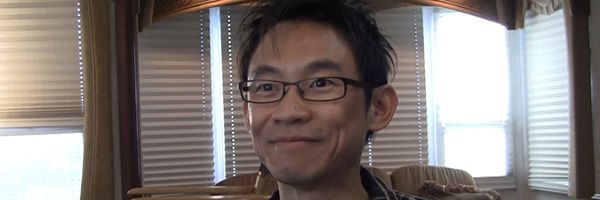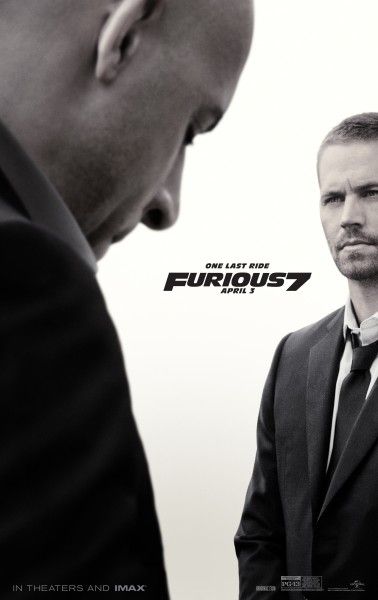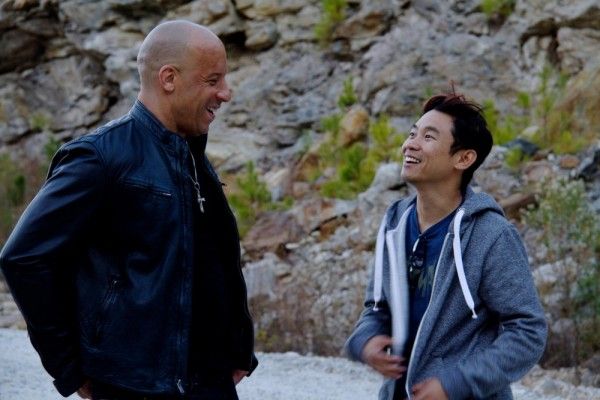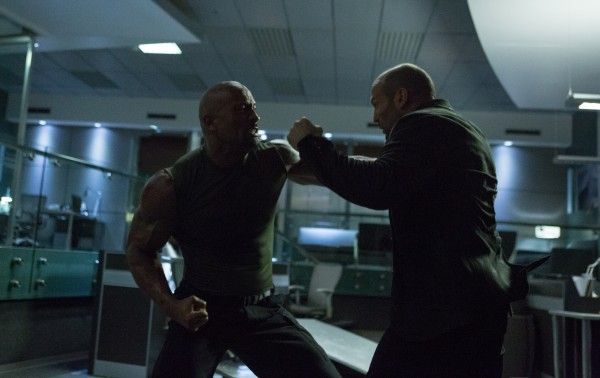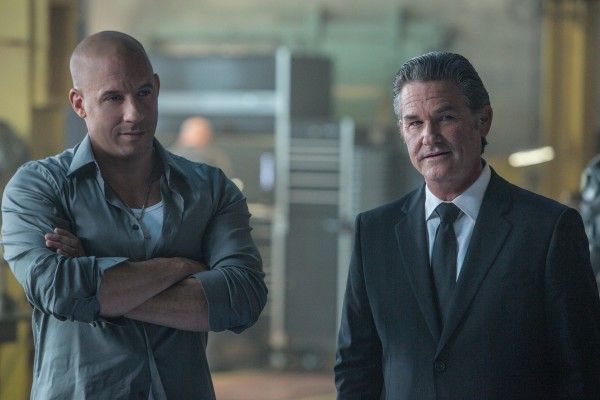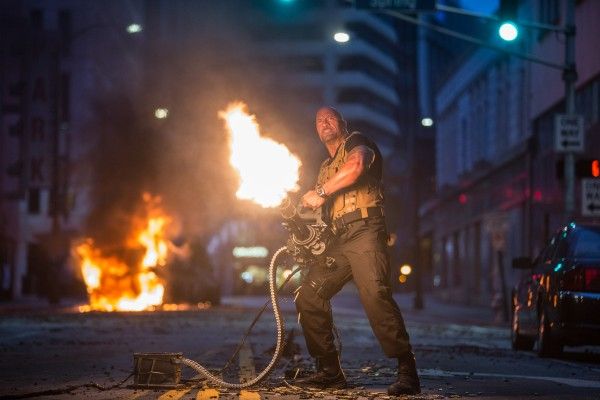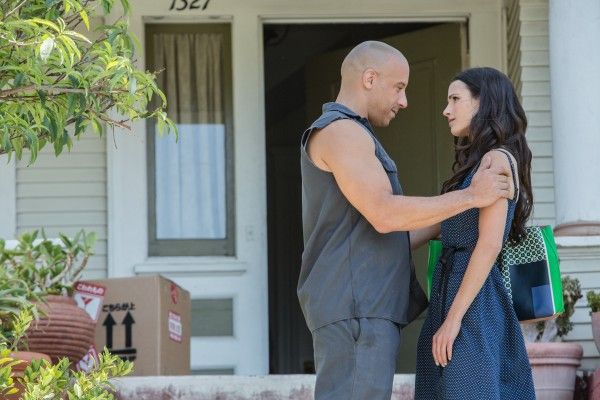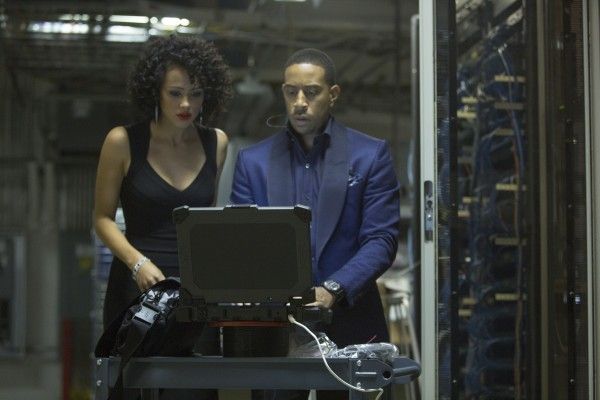While James Wan has proven himself again and again in the horror world with films like Saw, The Conjuring and Insidious, some wondered if he could make the transition to big-budget studio director. Now that many of you have seen Furious 7, he’s absolutely shown that he has the chops to handle a mega budget. And he did it under extreme circumstances. With Furious 7 destroying the box office around the world, the big question is what property he will take on next. I think he’s about to be able to direct whatever he wants.
At the Los Angeles press day, I landed an exclusive video interview with James Wan. He talked about his relief after reading the reviews, his first cut of the film, the original ending (before Paul Walker died) and what they decided to go with (without spoilers), directing the fight scenes, taking on a franchise of this size and scale, The Conjuring 2, if he has a favorite DC superhero, and a lot more.
Finally, unlike a lot of our video interviews, rather than offering a time index and the video, I’m posting the full video below followed by a transcript so you can either read or watch what James Wan had to say. For more on Furious 7 click here. The link has clips, our review, images, and more.
Collider: First of all, let me start by saying congratulations on the movie.
JAMES WAN: Thank you.
I think you had a next to impossible job and you did it so admirably, and I’m sure you’re hearing that from everyone. After going through what you went through, what is the sense of having everyone be so enthusiastic?
WAN: Well it’s first and foremost relieved, because I say that this was a huge monumental task, and generally the reaction for the movie so far has been overwhelmingly positive in a very big way, and I’m so happy for that. But every now and then you get one of two people that go “eh, meh”, and I say to myself if they only knew what it took to get to that “meh” stage, if only they knew how hard it was to land this burning plane, they would understand how difficult it was. It was a really challenging movie to make to begin with, but to add to it this extra level, it was something that none of us have ever experienced before. And it wasn’t like I could just pick up the phone and just call someone and ask them “hey, what did you do when this happened to you?”, right? This was unprecedented, and so it took a lot of soul searching to get it to this final stage.
How long was your first cut when you were starting to put it all together?
WAN: I have a tendency to overcut my movies. Like this one, I actually cut it a lot shorter than what the producers wanted. They were like “oh my god, James, you went too far!” Because you know I tend to kind of go “oh, well, this is what they want”. The studio mentality or people generally want shorter movies, and these films tend to be very long. So I kind of overcompensated and cut it really short. And luckily, we all kind of go “oh, you know what? Okay, it’s great”, so we saw that as a foundation and we sort of went back and started adding in a bit more stuff here and a bit more stuff there to make up to what it finally is.
Now was it footage that you had shot and then you’re adding it back in, or was it footage you’re like ‘wait a minute, oh we need to do a little extra photography?’
WAN: It’s stuff that I had already shot. Believe it or not, just about every movie that they make has reshoots and pick-ups and stuff like that, and on this film, we basically only had one or two days of pick-ups of shoots to do, and that’s nothing on a movie this size. But that’s only because when the incident happened, and that was halfway through the film, we took time off to re-assess what we have and to kind of go through it and, you know, see what we needed moving forward. And that time off was what we really, really truly needed to know how to push forward with the ending.
Totally. And I don’t want to talk about the ending specifically, but I will say I believe most people are going to be very happy with the resolution and what you guys did with it.
WAN: Yeah, I really hope so, because you know when I first heard the news, I was shell-shocked like everyone, and it took me days to come to terms with it. And then after that, heartbreaks started sinking in and we realized that Paul [Walker] wasn’t going to be around with us anymore moving forward. And it was a really hard one. And finishing the movie was the last thing on my mind at that point. It was more the idea of you know, picking up the pieces, going back on set, you know rallying the team, the cast, and the crew, and as the director having to put on the brave face and sort of like champion and push everyone along, the idea of that was very daunting for me. But it became very apparent to all of us that we needed to finish this movie to honor Paul’s legacy and to basically honor his memories, and moving forward that became our number one goal. Like nothing else mattered, it was about making this movie for Paul.
One of the things I really dug is the way you shot some of the fight scenes with the moving camera, you know, flipping. When did you come up with all that, the idea for doing what you did with some of the camera moves?
WAN: I mean, my philosophy…I’m such an action movie junkie that as an action fan, because action scenes are so heightened, we could never really picture ourselves in that scene. So when you’re watching an action movie, you experience an action movie more outside of the aquarium, you know you’re out of the aquarium looking in at all the swimming fish that are in there. Whereas horror films and thrillers are designed to put the audience into that box, into that aquarium, and so what makes horror movies work is the idea that “oh my God, what would I do if I were in that situation? How would I get out of that alive? What would I do if I saw the door to my closet creaking open in the middle of the night and a doll on a tricycle comes riding out?” So I tried to apply that kind of thinking to it. And I realized that my camera work could help me in a lot of ways to put the audience in the driver’s seat, so to speak, to get them in there with the action, and to get them as close and be as intimate with what was going on on-screen as possible.
So designing the technical aspects of my camera movement for me was very important. I wanted to the camera to be a big part in telling the story as well, like what I really believe in with all the films I make. To give you an example, the opening of the movie, the opening shot of the film, is a one-take shot where it reveals Jason Statham’s character. Without giving too much of it away, you see him expouting the blood-off, declaring a blood-off, declaring the vengeance he’s going to go on, this pout of vengeance, take out the people that hurt his family, and then he walks out of the hospital and the camera just follows him basically in one take. And I thought that was important in saying who his character is in that he’s very single minded in his quest for vengeance and also I thought it helps build the mythology of this character that’s larger than life, that has an anti-hero almost western quality to him, that he wasn’t an outright bad guy, but he was more like an anti-hero, almost like a classic sort of Clint Eastwood character from his spaghetti western days. And so that was how I wanted to kind of portray Jason’s character with the camera work.
What’s interesting is I’m a huge film buff and I notice when the camera’s not cutting. And I always wonder how much does Middle America…
WAN: Appreciate that?
Do the casual people that are watching the movie, do they notice that the camera’s not cutting, or is it just for us film nerds, that we notice?
WAN: I don’t know, but I think it’s okay if they don’t realize that. I think it’s okay if they just feel it. You may not quite understand the cinematic tricks that go behind the making of a film, but as long as you feel it, I think that’s the important thing.
I’m a big fan of the franchise. I’m curious, have you guys talked about what the original ending was gonna be for Furious 7?
WAN: Yeah, listen, the original ending served a very different purpose.
Going into Furious 8?
WAN: Yeah, exactly. The original ending of Furious 7 was setting up, you know, the bigger world of where the Fast and Furious franchise could go into. And that’s obviously very smart of them to think so. But when the tragedy happened, all of that became irrelevant. So it did not matter anymore, all of that stuff. And to the studio’s credit, they did not push for that. They realized how important it was to make a movie that finishes and that just outright is a tribute to Paul Walker. So I give them a lot of credit for being bigger than that and going along with this ending that is the right ending to go with.
This is your first time managing the crew for a ship of this size. It’s just a massive, massive movie. How much was Neil Moritz your producer, able to sort of shield you? What was the experience like jumping from a world where you probably have so much creative control to being the studio is very much following along? ‘How are you gonna shoot this? What are you gonna do with that?’
WAN: Right, no, I mean of course. I came into this with no disillusion that—I wasn’t delusional in any way in thinking that this was my franchise. It wasn’t. This belongs to Neil Moritz, this belongs to Universal Studios, this belongs to Vin [Diesel] and all the cast, but they were very cool as well. They wanted my voice, and so I came into this knowing that it is a number 7 for goodness sake, it’s such a well-established machine, and of course they have it down to a great degree of how these films are made. And so I came into this knowing that the sandbox was very well constructed already. This is the analogy I use: the sandbox is there already, you come into it and I say, ‘Okay I know I need to play within the sandbox, but hopefully the sandcastle that I get to build is mine.’
And I think with the camera work and all the things we’ve talked about definitely brought it. I know I’m running out of time with you, but in my mind, I was thinking maybe one of the reasons why you’re making The Conjuring 2 next is because maybe from there you’re going to jump into a DC superhero movie. Because you know the people at Warner Bros., they like filmmakers, if you will.
WAN: Yeah, it’s weird. Continuing that family tradition, they are like that. And it’s almost like they’re very old school in that respect, which you really don’t quite see much often anymore.
I definitely wanna know if you have a favorite DC superhero of any kind because they’re making like 20 movies over there.
WAN: You mean of the ones that they haven’t done yet? Yeah, there are some that I like.
So I mean, is there a possibility that you could be playing in that sandbox? Is that something that interests you?
WAN: I’m open to all possibilities at this point.
Okay, I’ll stop teasing you on that. I got to tell you, I really dug The Conjuring, like a lot.
WAN: Thank you, thank you.
And as much as I wanna see you tackling other things, I’m also excited to see you go back to there. Because you make really good scary movies. So have you already been thinking about that?
WAN: I’ve been working very heavily on the script. And the idea of continuing the saga of Ed and Lorraine Warren is actually very exciting, and so the idea of going back to kind of nurture my baby that I created is part of the reason why I’m going back to do The Conjuring 2. And you know, in some ways it’ll be kind of like a holiday break for me after this film, so it’s cool. But I definitely—while I do Conjuring 2, my plan would be to start setting up finding that next big film that I wanna jump into.
My last thing for you, when do you start filming it?
WAN: Conjuring 2? Later this year. Because I’m taking some time off.
I really don’t blame you.
WAN: Yeah. My next big assignment that I wanna do is sleep.
And maybe watch some movies.
WAN: And watch some movies! That’s the problem, when you make movies, I find that I never have time to go to the movies and enjoy movies like I used to, because I’m so movied out, right, I’m so filmed out that the last thing that I wanna do is with the little spare time that I have is stick in a dark room and watch more stuff on the screen.
I think the other thing is that some filmmakers have told me one of the reasons they don’t watch movies is because they don’t wanna be influenced by something they’re seeing.
WAN: There’s that thinking behind it, but for me I’m just too tired, that’s it. I’m just too tired with watching more stuff on the screen.

